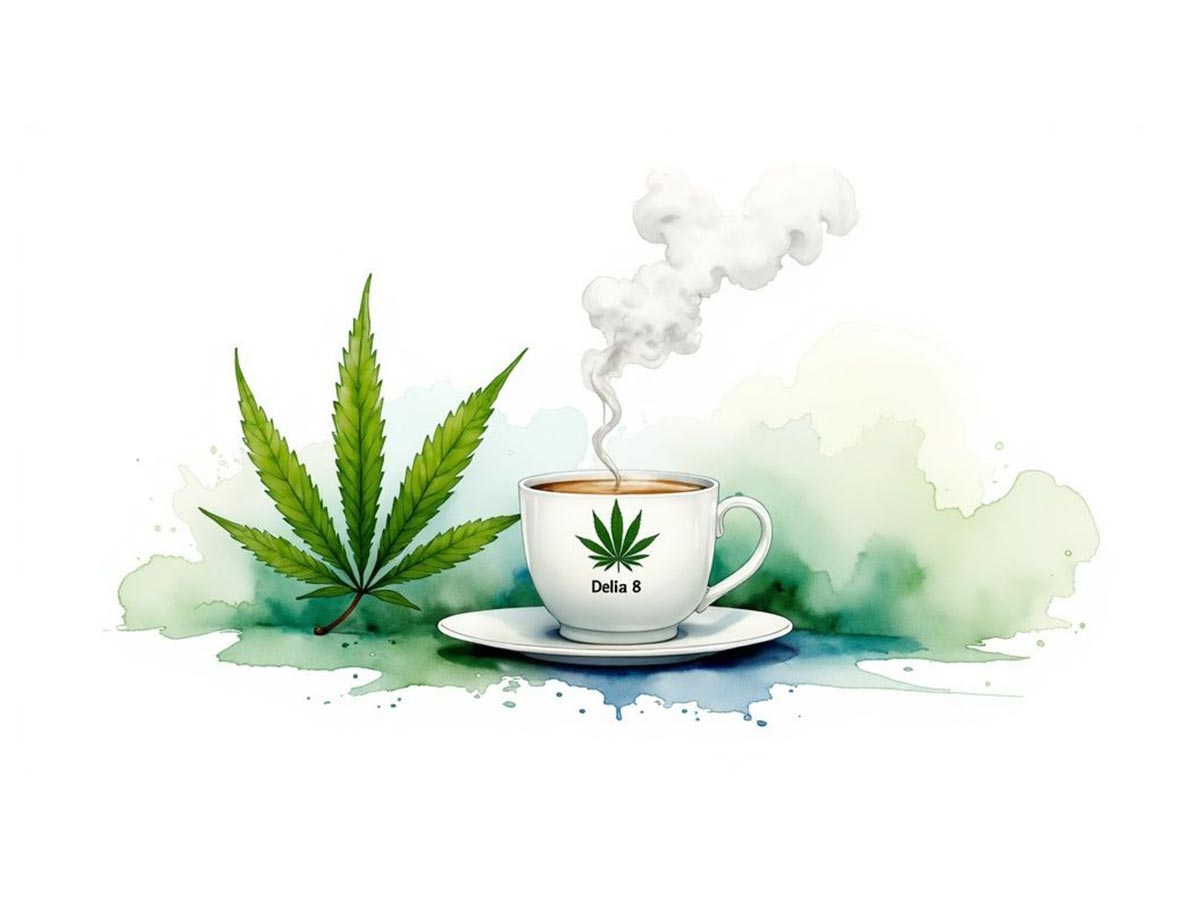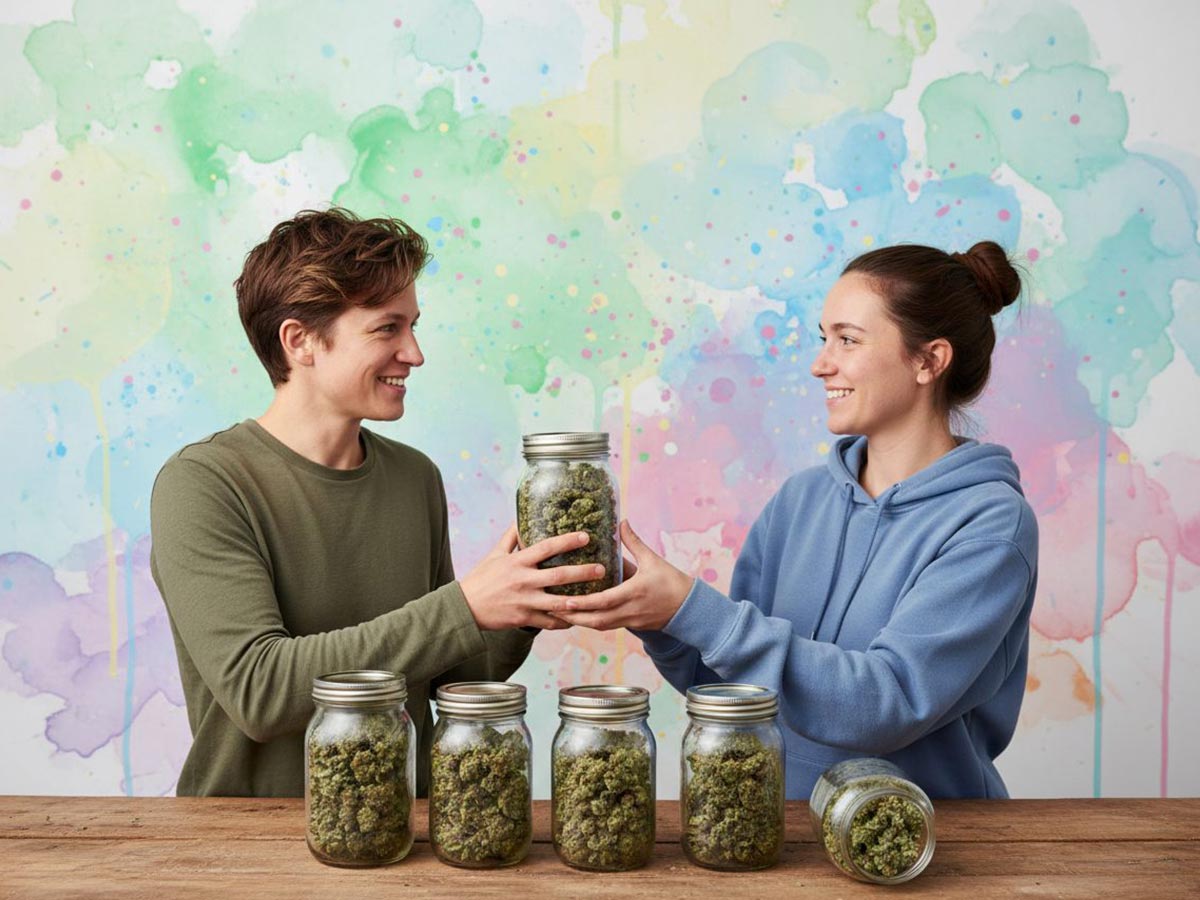You’ve likely heard the buzz around Delta 8 THC, and for good reason. It’s a naturally occurring compound found in cannabis and hemp that’s making waves for offering a smoother, clearer experience than its famous cousin, Delta 9 THC. For many, it delivers a relaxing, euphoric feeling without the anxiety or mental fog that can sometimes accompany traditional cannabis.
Ready to understand what all the hype is about? This guide gives you the clear, actionable insights you need to decide if Delta 8 is the right choice for you.
What Is Delta 8 THC, Really? A Simple Introduction

Think of the THC family like siblings. You have the famous, powerful one—Delta 9—and then you have its more laid-back cousin, Delta 8. On a chemical level, they’re nearly identical. But one tiny difference in their molecular structure changes everything, altering how Delta 8 interacts with your body and making the entire experience much gentler.
This subtle distinction is precisely why so many people are drawn to it. They’re searching for something that hits the sweet spot: noticeable enough for a pleasant buzz but not so intense that it becomes overwhelming. It’s the balanced middle ground many have been waiting for.
The Laid-Back Cousin of Cannabis
People often describe the Delta 8 feeling as one of calm and clarity. Instead of the powerful head-rush you might get from Delta 9, users consistently report feeling more relaxed, focused, and completely functional.
Practical Example: Imagine trying to brainstorm a creative project after a long day. A high-potency Delta 9 product might leave you feeling too fuzzy to focus. With Delta 8, many find it quiets the mental chatter, allowing creative ideas to flow without sacrificing clarity. It’s perfect for low-stakes social hangouts or simply taking the edge off.
Delta 8 offers a functional kind of relaxation. It’s designed for creative projects, social gatherings, or unwinding after a long day. It’s all about finding a gentle, productive balance.
Here’s an interesting fact: Delta 8 exists in only tiny amounts in the cannabis plant. To create the products you see on shelves, most of the Delta 8 is scientifically converted from hemp-derived CBD (cannabidiol). This production method is the key to its widespread availability, but also fuels the complicated legal debate we’ll dive into later. To learn more about the plant itself, explore our guide on understanding cannabis flower and its diverse compounds.
What to Expect From Delta 8
Everyone’s body chemistry is unique, so experiences will vary. However, most people who try Delta 8 report a few consistent effects. Knowing what to look for helps you set the right expectations.
- Gentle Euphoria: A light, uplifting feeling that can elevate your mood and spark creativity without being overpowering.
- Clear-Headed High: Unlike the sometimes foggy or disorienting effects of Delta 9, many users feel present, lucid, and in control.
- Body Relaxation: A soothing physical sensation that helps melt away tension and promotes a sense of calm.
Ultimately, understanding what is Delta 8 THC is simple: it’s a milder alternative in the world of cannabis, offering a unique and manageable experience for newcomers and seasoned users alike.
The Simple Science Behind How Delta 8 Works
So, what really separates Delta 8 from its more famous cousin, Delta 9 THC? It all comes down to a tiny, almost imperceptible difference in their chemical makeup. It’s a perfect example of how a small tweak can lead to a radically different result.
Think of it like two nearly identical keys. They look the same and feel the same, but one has a slightly different groove. While both keys fit the same lock—your body’s cannabinoid receptors—one turns it smoothly and gently (Delta 8), while the other turns it with much more force (Delta 9).
This tiny difference is a double bond on their carbon atom chains. It sounds technical, but all it means is this slight structural shift changes how firmly Delta 8 “grips” onto the cannabinoid receptors in your brain, resulting in a less intense effect.
From Hemp to Your Hands
Here’s where it gets interesting: Delta 8 THC only appears in tiny, trace amounts in natural cannabis and hemp. Harvesting it directly isn’t practical. So where does all the Delta 8 on the market come from?
The answer lies in clever chemistry. Most of the Delta 8 you see today begins its life as cannabidiol (CBD), which is abundant in legal hemp. Chemists use a safe and controlled process called isomerization to rearrange the molecules in CBD, effectively converting it into Delta 8 THC.
This unique origin story is central to its legal standing. Because it’s derived from hemp containing less than 0.3% Delta 9 THC, it falls into a special category created by the landmark 2018 Farm Bill.
This hemp-based production has made Delta 8 a popular alternative, particularly in states where traditional cannabis laws are more restrictive. It provides access to a THC experience for millions who live in places where recreational cannabis remains off-limits.
A Milder Connection
At the end of the day, Delta 8’s unique structure leads to a less intense handshake with your body’s endocannabinoid system. It’s still psychoactive, but the effects are consistently described as milder and clearer than what users experience with Delta 9.
This gentler connection is precisely why many people report a more functional, less anxious experience, often without the paranoia that can sometimes accompany more potent cannabinoids. It’s a way to experience the synergy of cannabis compounds, a concept you can explore in our guide on what is full spectrum cannabis.
Comparing Delta 8 vs Delta 9 THC
While they share the famous “THC” name, the experiences Delta 8 and Delta 9 offer feel worlds apart. Yes, they’re both forms of tetrahydrocannabinol, but how they affect your mind and body is a different story entirely. Understanding these differences is the key to discovering which one aligns with your goals.
Imagine Delta 9 as a bold shot of espresso—it hits hard and fast, delivering a jolt that can sometimes feel jittery or overwhelming. Now, think of Delta 8 as a smooth, warm cup of green tea. It provides a gentle lift, helping you find a sense of calm focus and relaxation without the intense rush.
This infographic captures the core difference in experience between the two.
The contrast between punchy espresso and serene green tea perfectly frames the fundamental choice: are you seeking potent intensity or functional clarity?
Potency and Psychoactive Effects
The most significant difference between Delta 8 and Delta 9 comes down to sheer potency. Delta 9 THC is famous for its strong psychoactive effects—it’s what creates the classic cannabis “high.” It binds very tightly to the body’s cannabinoid receptors, leading to powerful euphoria, altered perception, and for some, anxiety or paranoia.
Delta 8, on the other hand, is generally considered to be about half as potent as Delta 9. Its slightly different molecular structure means it doesn’t bind to those same receptors as aggressively. The result is a much milder, more manageable high that people often describe as clear-headed and calming.
Many users say Delta 8 provides a relaxing body sensation and a gentle mental lift, but without the heavy “head fog” that can come with Delta 9. This makes it a go-to for people seeking benefits like stress relief without feeling significantly impaired.
Because it’s less potent, people often feel more in control. This makes Delta 8 an appealing starting point for anyone new to THC or for those who have found Delta 9 to be too intense in the past.
User Experiences and Side Effects
When you listen to people describe their experiences, the stories for each compound are distinct. Both can stimulate your appetite and induce feelings of euphoria, but the overall journey tends to diverge.
Here’s a practical rundown of what you might expect:
- Delta 9 Experience: Often described as intense, euphoric, and sometimes disorienting. It can spark creativity and heighten senses, but it also carries a higher risk of side effects like anxiety, paranoia, or a racing heart.
- Delta 8 Experience: Commonly reported as relaxing, uplifting, and clear-headed. It tends to provide a smoother, more functional high that lets you stay present and engaged, with a much lower risk of feeling anxious.
Potential side effects also differ in intensity. While you might get a dry mouth or red eyes from either, the more disruptive mental side effects are far more common with Delta 9. For anyone trying to understand what is Delta 8 THC, its gentler side effect profile is one of its most compelling features.
Delta 8 vs Delta 9 At a Glance
To make the comparison even clearer, let’s break down the key differences in a table. This gives you a quick, side-by-side look at what sets these two cannabinoids apart.
| Feature | Delta 8 THC | Delta 9 THC |
|---|---|---|
| Typical High | Clear-headed, calming, functional | Intense, euphoric, potentially foggy |
| Potency | Roughly 50% as potent | High potency, strong psychoactive effects |
| Common Effects | Relaxation, mood boost, focus | Strong euphoria, altered perception |
| Legal Source | Primarily hemp-derived (federally legal) | Primarily from marijuana (federally illegal) |
| Anxiety Risk | Lower likelihood of causing anxiety | Higher likelihood of causing anxiety/paranoia |
As you can see, while they come from the same family, Delta 8 and Delta 9 offer fundamentally different experiences. Your choice depends on the effect you’re looking for—a mellow, functional buzz or a more potent, traditional high.
Understanding the Effects of Delta 8
So, what does taking Delta 8 actually feel like? While everyone’s body chemistry is different, the consensus points to a clear-headed, uplifting calm. It’s not the type of experience that leaves you foggy or glued to the couch. Instead, many people describe a functional relaxation that allows them to stay focused and creative.

Think of it as a gentle wave of relaxation washing away the day’s stress without pulling you under. That’s the sweet spot people seek with Delta 8. It’s perfect for unwinding with a movie, enhancing a walk in nature, or making social gatherings feel more comfortable and easygoing.
The Most Common Positive Effects
The effects of Delta 8 are best described as pleasantly “in-between.” It’s not nearly as intense as its famous cousin, Delta 9, but it’s noticeably more present than CBD. This unique middle ground is precisely why it appeals to so many.
Most users report a combination of the following:
- Gentle Euphoria: A light, happy buzz that lifts your mood without feeling overwhelming. Think subtle mood boost, not a full-blown high.
- Stress Relief and Calm: Many people turn to Delta 8 to take the edge off a stressful day, finding it helps them achieve a sense of peace and quiet.
- Increased Focus: For some, the milder psychoactive effects clear away the mental clutter from anxiety, making it easier to concentrate on creative projects or daily tasks.
- Increased Appetite: And yes, like other forms of THC, Delta 8 can definitely bring on a case of “the munchies.”
A common refrain you’ll hear is that Delta 8 offers “relaxation without the anxiety.” It delivers a smooth, manageable experience that lets users feel present and in control, making it a favorite for both newcomers and cannabis veterans seeking a gentler option.
Potential Side Effects to Consider
Of course, it’s crucial to understand the other side of the coin. While Delta 8 is known for being mild, it is still THC. Taking too much or being new to it can lead to some side effects.
The most common are usually temporary and not severe:
- Dry Mouth
- Red Eyes
- Drowsiness
Your personal tolerance, body chemistry, and the product you choose all make a significant difference. For example, a vape will take effect much faster than a tincture. To learn more about how different product types work, check out our guide on how to make cannabis tincture.
The golden rule is simple: start low and go slow. Begin with a small dose and wait to see how it affects you before even considering taking more.
Is Delta 8 Legal? It’s Complicated.
Figuring out if Delta 8 THC is legal can feel like untangling a knotted rope. The confusion stems from a major piece of federal legislation that opened the door for hemp products but left a few key details ambiguous.
At the federal level, everything changed with the 2018 Farm Bill. This landmark law officially legalized hemp and its derivatives, creating a clear legal distinction between hemp and marijuana based on one crucial number: 0.3%. As long as a hemp product contains no more than 0.3% Delta 9 THC by dry weight, it’s considered federally legal.
This is what created the legal pathway for cannabinoids like CBD. And since most Delta 8 is converted from hemp-derived CBD, it slips through this same legal opening. So, technically speaking, Delta 8 is federally legal.
You can find the full details at the official USDA portal for the Farm Bill.
Because the law specifically targets Delta 9 THC, it unintentionally created a space for other, less potent cannabinoids like Delta 8 to enter the market.
State Laws Are What Really Matter
Here’s the catch: federal law is only half the story. The 2018 Farm Bill also gave states the authority to create their own rules for hemp. This has resulted in a messy patchwork of laws that vary dramatically from one state to another, creating what many call a legal “gray area.”
As Delta 8’s popularity soared, many states stepped in to regulate or ban it. Some have outlawed it entirely, while others allow it to be sold, sometimes with specific restrictions.
This is why you can find Delta 8 products on shelves in one state, then drive across the border and find it’s completely illegal. The rules are constantly changing, so it’s absolutely critical to know your local laws before making a purchase.
The Bottom Line: While the 2018 Farm Bill makes Delta 8 federally legal, your state’s laws are what truly matter. Always check local regulations before you buy.
This legal uncertainty hasn’t slowed the market’s explosive growth. The global cannabis market is projected to skyrocket from $72.83 billion in 2025 to $125.76 billion by 2030, largely fueled by demand for accessible products like Delta 8 edibles and vapes. You can discover more insights about the global cannabis market’s rapid expansion here.
How to Check the Laws Where You Live
Since the legal landscape is always shifting, staying informed is the only way to make smart, safe, and legal choices. Here are some actionable ways to check the status of Delta 8 in your area:
- Check State Government Websites: Your state’s department of agriculture or health website is the most reliable source for the latest hemp regulations.
- Follow Reputable Industry News: Cannabis-focused news publications are excellent for tracking changes to state laws as they happen.
- Consult Local Retailers: Staff at local, reputable CBD or vape shops are often well-versed in current local rules.
Getting accurate, local information is the best way to navigate the world of Delta 8 with confidence. Consider this a guide to help you find the resources you need, not as legal advice.
Answering Your Top Questions About Delta 8 THC
Even after covering the basics, you probably have a few practical questions. That’s completely normal. When deciding if Delta 8 is right for you, the everyday details are what matter most. Let’s tackle the most common questions head-on.
Will Delta 8 Make Me Fail a Drug Test?
The short answer is almost certainly, yes.
Here’s why: standard drug tests aren’t designed to distinguish between different types of THC. They screen for THC metabolites, which your body produces after processing any form of THC. Since Delta 8 and Delta 9 are so chemically similar, the tests cannot tell them apart.
Actionable Insight: If you are subject to drug testing for work or any other reason, the only safe course of action is to avoid all Delta 8 products entirely.
How Do I Know if a Delta 8 Product Is Safe?
In a largely unregulated market, transparency is everything. Product quality can vary wildly, which is why reputable companies go above and beyond to prove their products are safe and accurately labeled.
The gold standard for safety is a recent, third-party lab report, also known as a Certificate of Analysis (COA). This document is your proof that the product has been tested for potency (what’s in it) and purity (what’s not, like pesticides, heavy metals, or residual solvents).
If a brand makes its COAs difficult to find or if they are outdated, consider it a major red flag and look elsewhere.
What Are the Most Common Delta 8 Products?
One of the best things about Delta 8 is its versatility. You can find it in many of the same forms as CBD or traditional THC products, allowing you to choose a method that fits your lifestyle and preferences.
Some of the most popular options include:
- Gummies and Edibles: A fan favorite for their ease of use, discreetness, and long-lasting effects. You can find everything from simple gummies to more indulgent treats, like those in our guide to THC candy bars.
- Vape Cartridges: The ideal choice for fast-acting effects, perfect for those seeking quick relief.
- Tinctures: Liquid extracts dropped under the tongue. They offer a great middle ground—kicking in faster than edibles but lasting longer than vapes.
- Hemp Flower: Hemp flower that has been infused or coated with Delta 8 distillate, providing a more traditional smoking experience.
Each product offers a different onset time and duration, so feel free to experiment to find what works best for you.
What Should I Look for in a Delta 8 Brand?
Choosing the right brand is as important as choosing the right product. A trustworthy company isn’t just selling a product; they are building a relationship based on transparency, quality, and customer education.
When evaluating a brand, look for these key indicators of trust:
- Accessible Lab Reports: As mentioned, current third-party COAs should be readily available for every product. No excuses.
- Genuine Customer Reviews: See what real people are saying on independent sites or forums to get an unfiltered view of their products and service.
- Clear Product Information: The brand should be upfront about all ingredients, provide clear dosing guidelines, and explain how to use their products safely.
- Responsive Customer Service: A solid company will have a team that is easy to reach and happy to answer your questions.
Finding a brand with a strong, positive reputation in the community is your surest sign that you’re in good hands.
At VT Strong Cannabis Dispensary, we believe an exceptional cannabis experience begins with great information. We are committed to providing our community with premium, Vermont-grown products and the knowledge to enjoy them safely and confidently. Discover the difference that local craftsmanship and care make by visiting us at https://vtstrongcannabis.com/store/.



